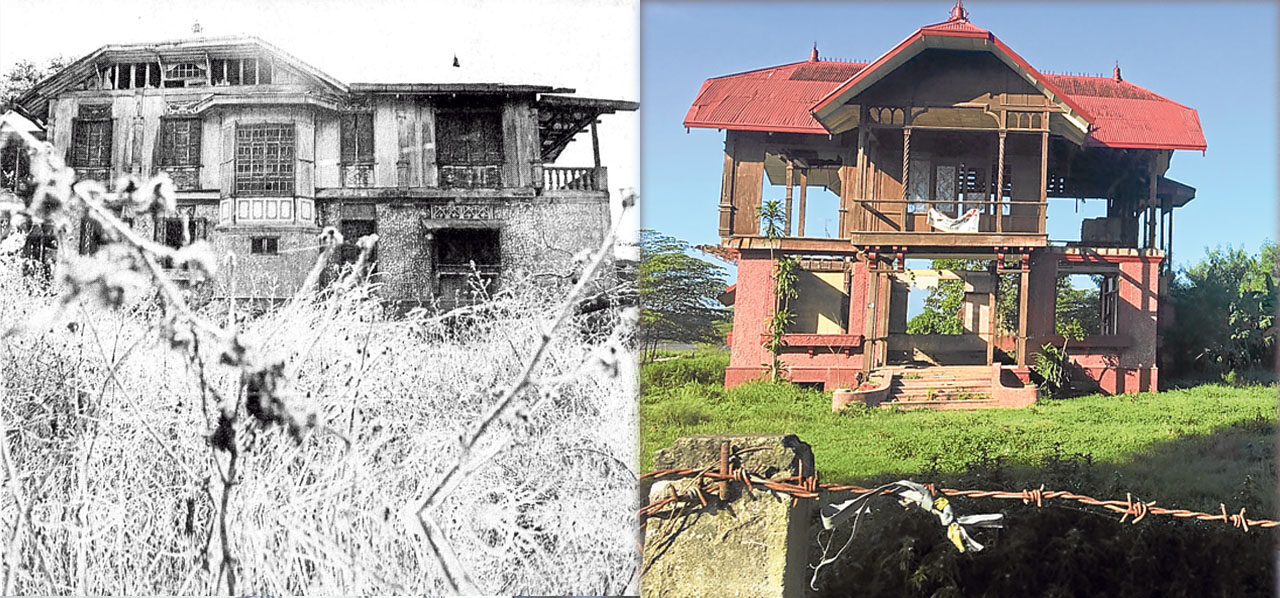‘Comfort women’ support group: Turn ‘Red House’ into shrine

MEMORIAL TO HORRORS The Committee on the Elimination of Discrimination Against Women (Cedaw) is recommending the preservation of the Ilusorio Mansion (1997 photo on left), also called Bahay na Pula (2019 photo, right), in San Ildefonso, Bulacan province, as a memorial to the horrors experienced by young girls, their mothers, aunts, and even their grandmothers, who were forced into sexual slavery in this house by the Japanese Imperial Army during World War II. The UN body says the Philippines violated their rights by failing to provide them with reparation, social support, and recognition for their ordeal. —JOAN BONDOC / TONETTE T. OREJAS
The coalition advocating justice for comfort women, or victims of sexual slavery during World War II, wants “Bahay na Pula” (Red House), the home in Bulacan province where they were abused by their Japanese captors, turned into a shrine.
“We should turn the Bahay na Pula into a museum, as a shrine for our comfort women and to honor the victims,” civic leader Teresita Ang See said at a press conference on Friday.
But Ang See, a cofounder of the Flowers for Lolas coalition, also suggested that a memorial could be established in another site if the house in San Ildefonso town, being a private property, is not available for that purpose.
The red-painted house owned by the Ilusorio family was built in 1929.
READ; Flashback: ‘Bahay na Pula’
Article continues after this advertisementMore than a decade later, following their occupation of the country in 1942, the invading Japanese turned the property into one of their barracks.
Article continues after this advertisementAccording to the United Nations’ Committee on the Elimination of Discrimination against Women (Cedaw), women and even girls who were not yet in their teens were “forcibly taken” to that house and “repeatedly subjected to rape, other forms of sexual violence, torture, and inhumane detention conditions.”
Acting on a complaint filed in 2019 by Malaya Lolas (Free Grandmothers), a group of surviving comfort women, Cedaw issued a ruling on March 8 saying that the Philippine government “violated the rights of [these] victims … by failing to provide reparation, social support and recognition commensurate with the harm suffered.”
The committee further “requested that the Philippines provide those victims full reparation … and an official apology for their continuing discrimination.”
READ: PH failed to aid World War II ‘comfort women’ – UN body
Buying the house
For defenders of comfort women’s rights, reparation includes establishing a shrine in their honor.
But Virginia Suarez, a lawyer for the Malaya Lolas, also noted that Bahay na Pula and the land it occupies are still owned by the Ilusorio family.
“It has to be bought. And to buy a private property, that’s possible. The government can do so if it’s for public use like what we propose,” she said in an interview following the press conference.
“All the government has to do is to exercise its power of eminent domain and then it can buy any private property for public use,” she added.
Suarez said the coalition is currently discussing that option with a “study group” formed by Justice Secretary Jesus Crispin Remulla in response to the Cedaw ruling.
Ang See said the house, while it is “most appropriate for the purpose” of honoring comfort women, has become a “total derelict.”
But she said the government can rehabilitate that house or replicate its design and structure for another memorial site.
Both Ang See and Suarez also said they will propose restoring the “Filipina Comfort Women” monument.
In 2018, the Department of Public Works and Highways removed the statue from its site on Roxas Boulevard, a month ahead of the May 3 annual summit of Japanese-led Asian Development Bank.
READ: Removal of ‘comfort woman’ statue draws protest
At that time, the department said the monument was in the way of a drainage improvement project.
Ang See said it was that incident which prompted her and the others to form the Flowers for Lolas coalition.
“[We should] commemorate the suffering inflicted to the victims and survivors of wartime sexual slavery and … honor their struggle for justice,” she said.
Immediate action
Suarez said the government should not drag its foot on the Cedaw ruling.
“You have everything in the resolution already. All the government needs to do is implement this using all its powers,” she said.
“If the government can issue executive orders on other issues, then why can’t they do it here?” she added.
READ: PH comfort women: Statues removed but pain remains
Sharon Silva, spokesperson for Lila Pilipina, another group championing the rights of comfort women, also called for the government’s immediate action.
“Time is of the essence. Act. Please do not wait for six more months, because they may no longer reach past that,” she said at the press conference.
“As far as victims are concerned, they simply want historical inclusion. In their twilight years, they need assistance in narrating their experience so memoirs may be memorialized. These crimes must be studied and thus be prevented from happening again,” she added.